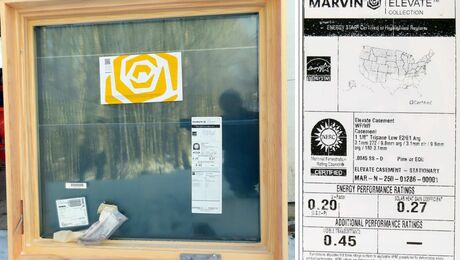Insulate basement wall or basement slab?
I am in climate zone 5 and building a full basement home. I don’t have the money to do both rigid foam on basement walls and under the slab, what is the better choice? the better bang for my buck?
thanks
GBA Detail Library
A collection of one thousand construction details organized by climate and house part









Replies
Insulate underneath the slab. You will never get another reasonable chance to do it in the life of the building. You can always insulate the walls later, and (IMO) if you are insulating the walls from the interior, it'd be a better idea to wait for a while to let the concrete and the rest of the house dry out before insulating/finishing the basement.
Jeremy<
I would say under the slab. You will never have access to it again. While that may be true for outside the walls as well (that can actually be dug up later, but usually the existence of decks, porches, bulkheads and landscaping make that impractical ), you can at least do a good job on the inside, including with rigid foam.
Jeremy, unless you are planning to insulate your first floor framing cavities, you should insulate the basement walls. There is much more heat loss through the foundation walls, especially above grade and for the first few feet below grade, than there is through the slab, which in zone 5 stays around 45-55°F year-round. If you are in an area subject to the IRC building code you are required to insulate either the foundation walls or the first floor.
Insulating below the slab is optional. It's a very good idea, and I agree with the guys above that you won't get another chance to do it, so I would skimp on something else and get your foundation properly, fully insulated. The money you save on energy will pay for the extra up-front cost eventually.
Another option: you could also consider leaving out both the slab and the foam, and put in both when you can afford it. In that case, you should use a heavy-duty vapor barrier, and prepare to provide a lot of ventilation and dehumidification when the slab is poured. http://www.stegoindustries.com/products/stego-wrap-15-m-1.php and http://www.viper2.com/ are two such vapor barriers.
Jeremy: use reclaimed foam and do both. Compared to the rest of the house, insulating basement walls and under the slab is cheap and easy to DIY. There are other places you can save money and do later.
Jeremy,
This is a tough one. Everyone has given you good advice. Most of the heat loss happens through your walls, but you will never again have access to the area under your slab.
One point no one has yet mentioned: It is a code violation to omit basement wall insulation.
Continuous R15 is code min for walls. In zone 5 you can get away with 1" polyiso + a 2x4 unfaced batt-insulated studwall (no interior side vapor retarders) if the flood risk is zero. In new construction it's sometimes easier/ cheaper/quicker to pour the foundation walls in a minimalist R16-R20 insulated concrete form.
Insulating the slab has very LOUSY bang/buck from an energy-use point of view, but is necessary to limit the summertime mold risk due to slab temps at or below the outdoor dew point. (Any leaks or unconditioned ventilation air adds moisture to the slab, and anything resting on it.) Even an inch of Type-II EPS (about 40 cents per square foot, installed) between the gravel and a top-side vapor barrier under the slab is enough to be protective.